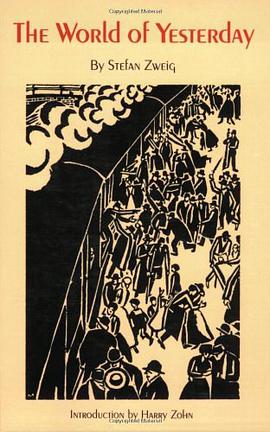
An Autobiography
Die Welt von Gestern
Stefan Zweig 译者: Helmut Ripperger / B.W. Huebsch
简介
Stefan Zweig (1881-1942) was a poet, novelist, and dramatist, but it was his biographies that expressed his full genius, recreating for his international audience the Elizabethan age, the French Revolution, the great days of voyages and discoveries. In this autobiography he holds the mirror up to his own age, telling the story of a generation that 'was loaded down with a burden of fate as was hardly any other in the course of history'. Zweig attracted to himself the best minds and loftiest souls of his era: Freud, Yeats, Borgese, Pirandello, Gorky, Ravel, Joyce, Toscanini, Jane Addams, Anatole France, and Romain Rolland are but a few of the friends he writes about. Stefan Zweig was an Austrian writer whose life connected with James Joyce, Richard Strauss, Sigmund Freud and Adolf Hitler - among many others. He was, essentially, a European of the old school, and his last book, "The World of Yesterday", testifies to this. Zweig was born in 1881; he lived to see the continent torn apart by two world wars and committed suicide in Brazil in 1942 when, after the fall of Singapore to the Japanese, he came to believe that a Nazi world was inevitable. "The World of Yesterday" was written shortly before his suicide and was intended as a literary capsule to remind future generations of the world that they had lost, and how that loss had come about. The main trajectory of the book is from an old world of seeming 'security' in which notions of peace, dignity and learning reigned, to the new world of war in which Hitler had destroyed all of these things. Zweig provides a vivid portrait of how war and terror can sweep over a people who are seemingly oblivious to what is happening to them. The process, in Zweig's view, vindicates the apparent pessimism of his friend Sigmund Freud - who believes that culture could never overcome the subconscious and malevolent desires of a people. Zweig lost almost everything he had to the Nazis. He was an Austrian jew who fled because he knew what was coming. The book is written entirely from memory. Its language consequently tends to lurch from the high flown and sentimental, to chillingly accurate vignettes of how a people can delude themselves about a catastrophe in their midst. He manages to convey his horror when, on his final visit to Austria, he realised that none of his friends and family could imagine the worst that could happen - and hence did not believe his exhortations to leave while they could: 'They invited each other to full-dress parties (little thinking that they would soon be wearing prisoner's clothes in a concentration camp)'.
其它版本
-
 昨日的世界 江苏凤凰文艺出版社 2023
昨日的世界 江苏凤凰文艺出版社 2023 -
 Verden af i går, klassiker Rosinante 2018
Verden af i går, klassiker Rosinante 2018 -
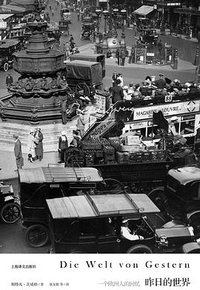 昨日的世界 上海译文出版社 2018
昨日的世界 上海译文出版社 2018 -
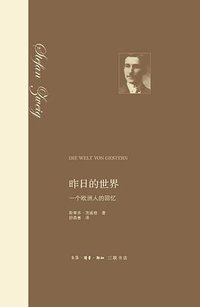 昨日的世界 生活·读书·新知三联书店 2018
昨日的世界 生活·读书·新知三联书店 2018 -
 昨日的世界 民主与建设出版社 2017
昨日的世界 民主与建设出版社 2017 -
 昨日世界 作家出版社 2017
昨日世界 作家出版社 2017 -
 昨日的世界 新星出版社 2017
昨日的世界 新星出版社 2017 -
 昨日世界 人民文学出版社 2015
昨日世界 人民文学出版社 2015 -
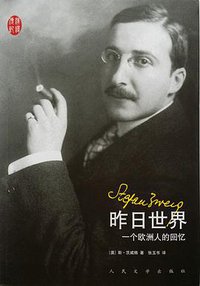 昨日世界 人民文学出版社 2015
昨日世界 人民文学出版社 2015 -
 遭遇这些事的人是我 2015
遭遇这些事的人是我 2015 -
 昨日的世界 生活·读书·新知三联书店 2014
昨日的世界 生活·读书·新知三联书店 2014 -
 昨日的世界 时代文艺出版社 2014
昨日的世界 时代文艺出版社 2014 -
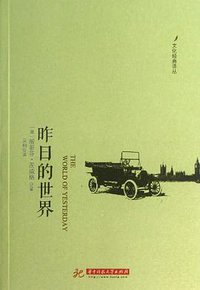 昨日的世界 华中科技大学出版社 2013
昨日的世界 华中科技大学出版社 2013 -
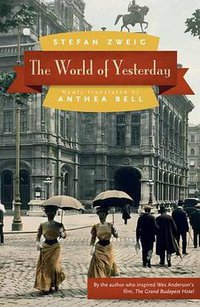 The World of Yesterday University of Nebraska Press 2013
The World of Yesterday University of Nebraska Press 2013 -
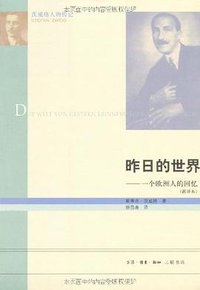 昨日的世界 生活·读书·新知三联书店 2010
昨日的世界 生活·读书·新知三联书店 2010 -
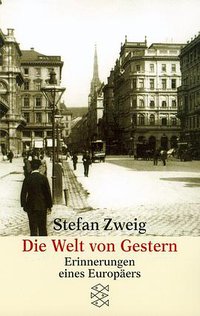 Die Welt von Gestern S. Fischer Verlag GmbH 2006
Die Welt von Gestern S. Fischer Verlag GmbH 2006 -
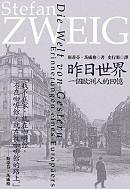 昨日世界:一個歐洲人的回憶 邊城 2005
昨日世界:一個歐洲人的回憶 邊城 2005 -
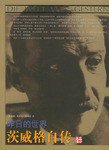 昨日的世界 团结出版社 2005
昨日的世界 团结出版社 2005 -
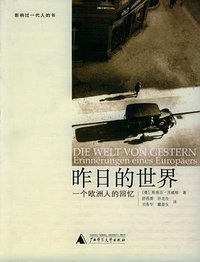 昨日的世界 广西师范大学出版社 2004
昨日的世界 广西师范大学出版社 2004 -
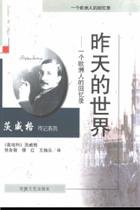 昨天的世界 2000
昨天的世界 2000 -
 昨日的世界 生活·读书·新知三联书店 1991
昨日的世界 生活·读书·新知三联书店 1991 -
 Die Welt von Gestern. Erinnerungen eines Europäers Fischer Taschenbuch Verlag 1985
Die Welt von Gestern. Erinnerungen eines Europäers Fischer Taschenbuch Verlag 1985 -
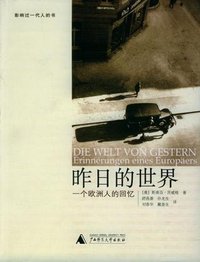 昨日的世界 广西师范大学出版社 None
昨日的世界 广西师范大学出版社 None -
 昨日世界 漫遊者文化事業股份有限公司 None
昨日世界 漫遊者文化事業股份有限公司 None